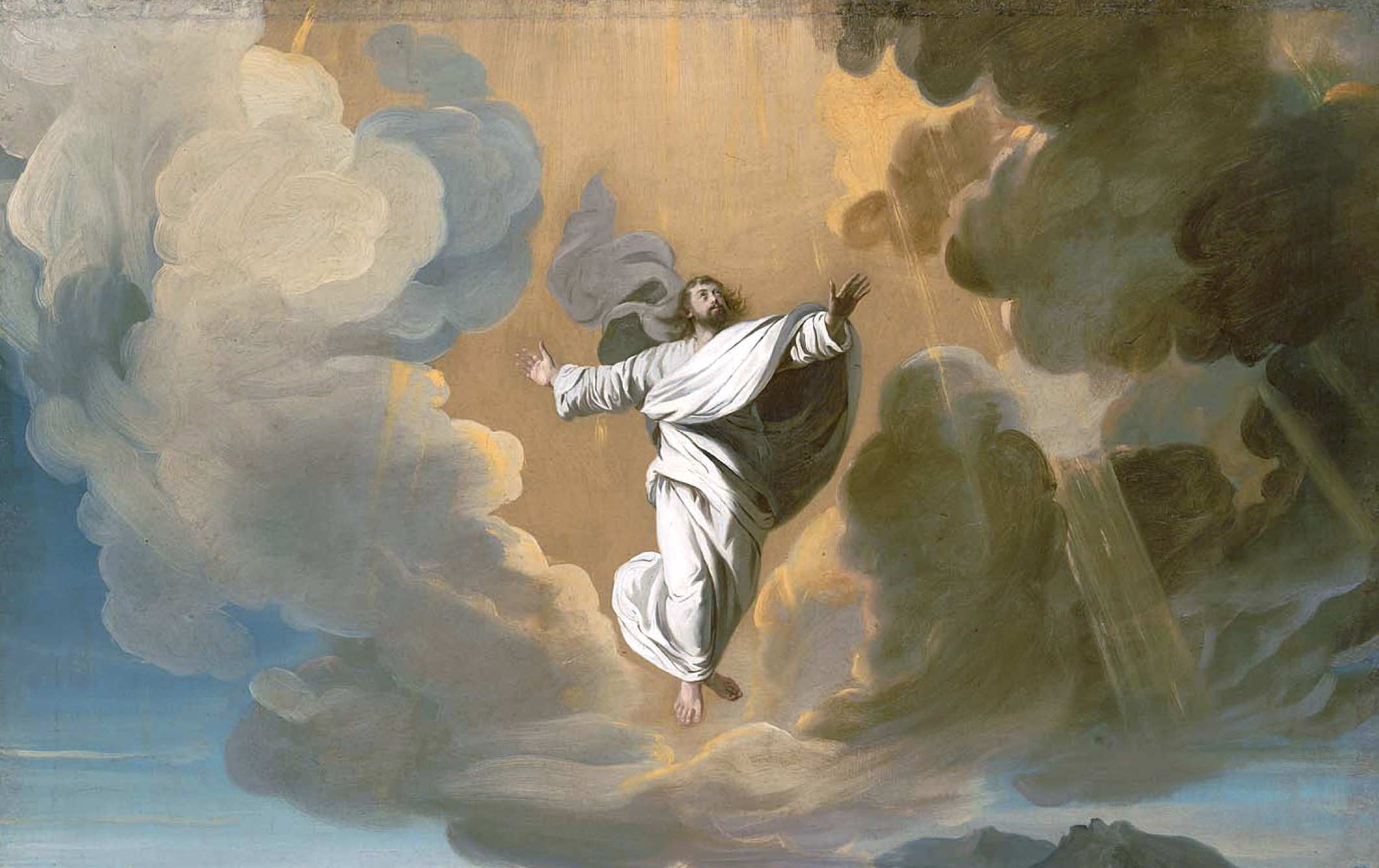The Feast of the Ascension of the Lord, which the Church celebrates toward the end of the Easter season, is, I admit, hard to explain to a lot of contemporary people. Jesus passed, in bodily form, from this world to heaven? Wouldn’t his body still be in some identifiable place within the solar system or the galaxy? I’m sure that the traditional formulation of the doctrine strikes many today as hopelessly pre-scientific and mythological. And even if we were to admit the possibility of such a transition happening in regard to Jesus, how would this in any way affect us spiritually?
The key to understanding both the meaning and significance of this feast is a recovery of the Jewish sense of heaven and earth. In regard to “heaven” and “earth,” most of us are, whether we know it or not, Greek in our thought patterns. By this I mean that we tend to set up—in the manner of the ancient Greek philosophers—a rather sharp dichotomy between the material and the spiritual, between the realm of appearance and the realm of true reality, between the fleeting earth and the permanent heaven. And if we’re spiritually minded, we tend to think of salvation as an escape from this world—this vale of tears—to a disembodied state called “heaven.” The problem is that these convictions have far more to do with Plato than with the Bible.
Biblical cosmology is not fundamentally dualistic. It speaks indeed of “heaven” and “earth,” but it sees these two realms as interacting and interpenetrating fields of force. Heaven, the arena of God and the angels, touches upon and calls out to earth, the arena of humans, animals, plants, and planets. On the Biblical reading, salvation, therefore, is a matter of the meeting of heaven and earth, so that God might reign as thoroughly here below as he does on high. Jesus’ great prayer, which is constantly on the lips of Christians, is distinctively Jewish in inspiration: “Thy kingdom come, thy will be done, on earth as it is in heaven.” Notice please that this is decidedly not a prayer that we might escape from the earth, but rather that earth and heaven might come together. The Lord’s prayer recapitulates and raises to a new level precisely what the prophet Isaiah anticipated: “The knowledge of the Lord will fill the earth, as the water covers the sea.”
Get on with the mission of the Church!
The first Christians saw the Resurrection of Jesus from the dead as the commencement of the process by which earth and heaven were being reconciled. They appreciated the risen Christ as the heavenly ruler of the nations, the one who would bring the justice of heaven to this world. And this is precisely why people like Peter, Paul, Thomas, Andrew, and John went to the ends of the earth to proclaim just this new state of affairs: “Jesus is Lord!” What began in the Lord’s Resurrection is now ready to burst forth and flood the world through the work of the disciples. Accordingly, just before ascending to heaven, Jesus said, “You will receive power when the Holy Spirit comes upon you, and you will be my witnesses in Jerusalem, throughout Judea and Samaria, and to the ends of the earth.” It is fascinating to note how the Ascension and Pentecost are linked: In the Ascension, something of earth moves into the heavenly sphere, and at Pentecost, something of heaven—the Holy Spirit—invades the earth. The two events constitute, in short, a foretaste of the great reconciliation for which the entire Jewish religion had for centuries yearned.
The Church, guided by the Holy Spirit down through the ages, is meant to be the privileged place where this coming-together happens. In good preaching, great Christian art, the architecture of our churches and cathedrals, the corporal and spiritual works of mercy, the lives of the saints, and perhaps especially in the liturgy, earth and heaven meet. Think of the moment at Mass just before the singing of the Sanctus, when the priest invokes the angels (the realm of heaven) and encourages us: “May our voices be one with theirs in their triumphant hymn of praise.” What he is suggesting is that earth might, with Christ, ascend to heaven and that heaven, in the person of the Holy Spirit, might descend to earth—and that the two dimensions might sing together in harmony.
What I hope has become clear in the course of this discussion is that the Ascension of Jesus has nothing to do with a literal journey into the stratosphere, for that would involve simply a transfer to another position within “the world.” The Ascension is Jesus’ journey, not to another place, but to another dimension. But this dimension to which he has gone is not alien to us. It is instead a source of inspiration, power, and direction. And this is why the angels (denizens of heaven) who appear to the disciples just after Jesus’ departure say, “Men of Galilee, why are you standing there looking at the sky?” What they are hinting at—none too subtly—is this: under the influence of Jesus’ spirit, get to work! Do all that you can to foster the marriage of heaven and earth! Get on with the mission of the Church!
This piece was originally published on May 27, 2011, in Evangelization & Culture Online.
